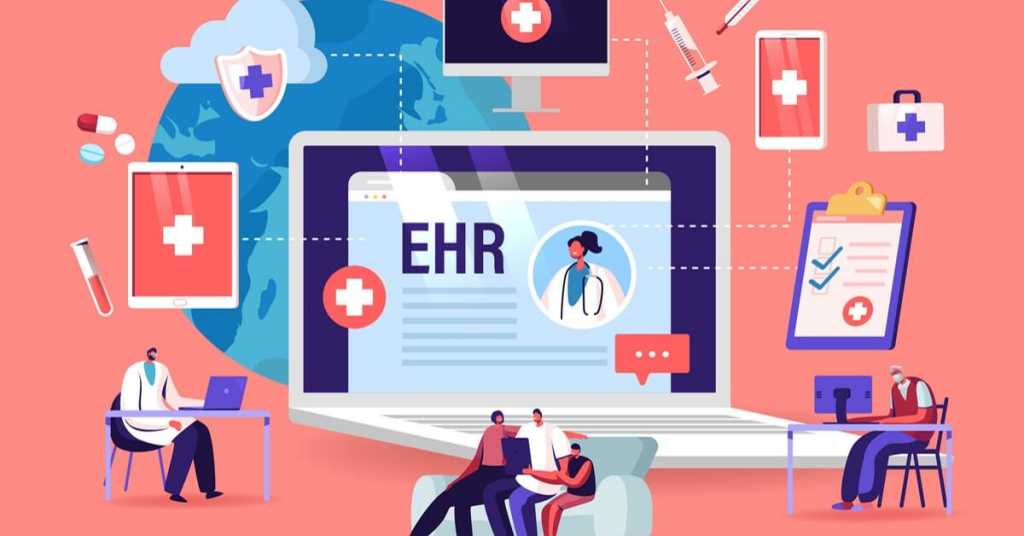The medical sector is complex, and it must stay attached to individual healthcare at all times, which is more challenging than ever. Healthcare providers and patients are highly dependent on telemedicine technology, such as EHR systems.
EHR systems bridge the gap between high-quality treatment and technological improvements. They are intended to give a practical, consistent, and convenient approach to the challenge of health record management.
An EHR is software used to gather, store, and distribute organized medical data. An EHR allows medical information to be shared across all authorized parties engaged in the patient’s care, including physicians, labs, pharmacies, emergency rooms, care homes, state registries, and sufferers themselves.
An EHR system provides the exchange of up-to-date information, retrieval of information outside of the particular practice, and the use of built-in decision-making tools.
The primary benefits of storing everything on a computer system are higher productivity owing to improved procedures and data availability.
EHR systems may be customized in a variety of ways. Each has advantages and disadvantages based on medical practice’s requirements and specifications.
Let us read further the different types of EHR systems.
Types of EHR System
- Physician-Hosted System
Physician-hosted systems imply that practically all data is stored on the servers of specialists.
This implies that a doctor is in charge of procuring network infrastructure and managing and maintaining the system housed on their servers.
A physician-hosted EHR system at their medical office may be advantageous for more extensive practices that can handle the overhead expenses of the complicated software. Employing on-site servers also helps an Electronic health record system run faster and is a more dependable means of communication.
This type of EHR system implies that electronic health record data is stored on the organization’s networks. Choosing physician-hosted systems necessitates the acquisition of software and hardware, including servers. Furthermore, professional staff should be assigned to manage data security and maintenance.
Physician-hosted EHR systems are an excellent choice for larger practices since they can pay the admin costs of such applications and the tools needed. On-site servers and the more significant data protection they provide can also benefit the EHR healthcare system. It is easy to limit storage access and maintain the most effective level of data security.
Furthermore, because they are placed on-site, professional medical systems perform better. It can make a significant difference for businesses that do not have dedicated internet service.
- Remotely-Hosted System
Remotely-hosted systems shift data storage away from the doctor and a third party responsible for maintenance, data backup, and protection. This solution relieves a single physician or clinical care of data upkeep.
This shift in responsibility may appeal to smaller practices or any medical provider who focuses on acquiring rather than conserving data. This approach reduces IT difficulties that might divert a physician’s focus from their patient’s condition.
As the name Implies, remotely-hosted EHR systems in healthcare are based on remote data storage. Patient data is moved to another entity’s servers. The third party is in charge of system upkeep, protection, and data storage.
This sort of EHR solution is chosen by small medical offices or providers that wish to offload the burden of information storage. Such software helps physicians focus on assisting patients rather than solving IT problems, becoming more widespread.
There are several advantages to having your EHR platform hosted remotely. When it comes to online EHR adoption, HIPAA security rules are a mandate.
Going remote hosted with an EHR provider can provide the HDO with the opportunity to delegate security responsibility to the vendor.
Furthermore, the vendor bears some responsibility for backup and disaster recovery demands, allowing firms without a full-fledged IT team to focus only on patient care and using their EHR as a tool for that objective without incurring the costs that self-ownership could imply.
Nowadays, we’ve also seen a surge in the expansion of cloud-based storage and technologies, which can provide even more versatility to hosted medical offices regarding data access and usage.
There are benefits of an EHR system in preserving one’s server infrastructure control. Many bigger medical groups have a complete IT team deployed to administer and support the infrastructure.
When those individuals work for the same company they serve, it provides for a degree of control and decision-making that the addition of a third party may sometimes skew.
There’s the convenience of rapid access, as well as the freedom to adjust or modify things like interfaces or SQL reporting scripts based on a patient’s business requirements, without the hassle of third-party modification control procedures.
Furthermore, most EHR suppliers that offer remote hosting services do not give complete back-end visibility and administrative control, which might limit an IT team’s capacity to self-diagnose and resolve issues.
As the healthcare IT environment evolved, many businesses began with in-house EHR implementation. They established procedures around that degree of ownership, sometimes going so far as to hire personnel to maintain their internal infrastructure.
Many firms must compare the economic benefits of hiring their own IT personnel against the price of implementing and maintaining a remotely hosted infrastructure with an outside partner.
- Remote System
Overall, remote systems for hospitals are classified into three basic categories:
Subsidized: In this scenario, a hospital pays for the EHR for a physician. The funding facility’s servers are used, and the doctor has no control over the information. While this strategy may be appropriate for small clinics with limited resources, it raises antitrust and data ownership problems.
A subsidized system is one in which another organization funds the cost of an EHR. Remember that a remote system involving a subsidized organization may raise legal difficulties, such as antitrust and data ownership issues.
Committed: A dedicated host system means physicians keep their EHRs on a provider’s systems. These servers are frequently located in certain areas. With this technology, a physician cannot regulate most data storage features.
Internet-based computing: Physicians entrust their patient data to a vendor who stores it on the cloud. They may quickly obtain the required medical online information. It is now the most common and extensively utilized data storage model in many EMR systems. Additionally, cloud-based EHR software is less expensive than competitors.
Which EHR systems Meet the Needs of Modern Healthcare?
We think that remote health monitoring is the next generation of community-based care. It helps individuals manage their conditions, remain independent, and relieve the load on family caregivers and the healthcare system.
One of the most frequent EHR remote options is a cloud or web computer system. Health care providers are not required to maintain data on their networks; instead, it is stored “in the cloud.” This means that the data is always securely stored online and made available via the vendor’s website.
Remote health system tracking uses wireless connectivity to link patients to their care team from the comfort of their own homes.
This ensures the secure exchange of health information, such as vital signs, and tracking progress toward achieving health goals to facilitate appropriate actions and raise awareness.
Remote health system monitoring can be an efficient technique to control the symptoms of diseases such as diabetes, heart disease, and hypertension.
It allows for the early identification of essential assistance, proactive engagement with your care team, and insights into your health.
The sole goal is to help individuals manage their health conditions at home, become active participants in their healthcare, and avoid hospital readmissions and emergency department visits.
The Final Takeaway
The first step in determining the best EHR system for your clinic is weighing your various alternatives’ benefits and drawbacks. You want to pick something that will work for you rather than something you need to change your whole practice to fit inside your organization.
If you lack flexibility in your budget or hardware development, choosing a solution that necessitates infrastructure or costly installation may not be in your best interests.
If you only examine it in the short term, the option between hosting and storing data may look shallow. However, in a long time, you must ensure the security of patient records. This is required to improve overall patient health outcomes and safeguard your medical practice and make your life a bit simpler.
Electronic health records are becoming an essential component of today’s healthcare scene. If you or your business is considering constructing your bespoke EHR system, we should make sure you’re on the correct route. Built-from-scratch EHR software can suit your demands in ways that no off-the-shelf product can.
Your EHR system will please all stakeholders thanks to its user-centric design and unique features. However, to accomplish so, you will want the services of a skilled, dependable, and experienced on-demand doctor app development merchant.

